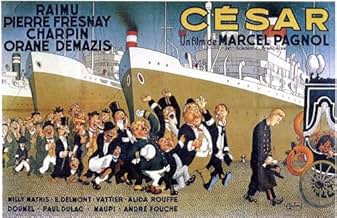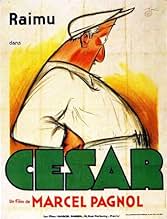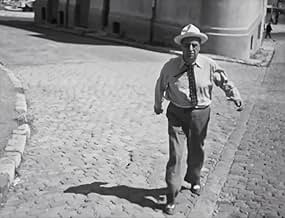Aggiungi una trama nella tua linguaHonoré Panisse is dying, cheerfully, with friends, wife, and son at his side. He confesses to the priest in front of his friends; he insists that the doctor be truthful. But, he cannot bring... Leggi tuttoHonoré Panisse is dying, cheerfully, with friends, wife, and son at his side. He confesses to the priest in front of his friends; he insists that the doctor be truthful. But, he cannot bring himself to tell his son Cesariot that his real father is Marius, the absent son of César,... Leggi tuttoHonoré Panisse is dying, cheerfully, with friends, wife, and son at his side. He confesses to the priest in front of his friends; he insists that the doctor be truthful. But, he cannot bring himself to tell his son Cesariot that his real father is Marius, the absent son of César, Cesariot's godfather. Panisse leaves that to Fanny, the lad's mother. Dissembling that he... Leggi tutto
- Regia
- Sceneggiatura
- Star
- Honoré Panisse
- (as Charpin)
- Innocent Mangiapan
- (as Maupi)
- Le docteur Félicien Venelle
- (as Edouard Delmont)
- Pierre Dromard
- (as Bassac)
Recensioni in evidenza
Still, there's enough room for musings on family, friendship and the sacrifices life demands. The cast is top-notch, with Raimu as brilliant as ever, while Fresnay delivers an electrifying speech towards the end.
Some may find the whole affair too slight, contrived and emotionally charged, but trust me, these three pics are definitely worth six hours of anyone's life... at least, anyone who loves good storytelling.
8 out of 10 hilarious deathbed confessions
'Cesar', the only one of the Marseille trilogy to not be directly based on the play, is the third and final film in the trilogy and a great way to end it. It is not quite as good as my personal favourite 'Marius', but is on the same level as 'Fanny' for generally the same reasons. Despite having occasional story problems, 'Cesar' (named after one of my favourite characters of the trilogy) is the most human, most understated and most moving of the three perhaps and benefits greatly from having Pagnol in the director's chair again and the original cast returning yet again.
It though does have the slightest story of the three films in the trilogy and the only one to feel slightly contrived on occasions. That is my only complaint though.
Like 'Marius' and 'Fanny', 'Cesar' looks lovely and surprisingly evocative. In fact all the great things of those two films are here, for the same and different reasons. Scotto returns as composer and his score is equally as whimsical and charming. Did appreciate that 'Cesar' did have a much better beginning than that of 'Fanny' and that it got to the point much quicker.
There is some nice wit in the writing, the dialogue can be described in the same way as the dialogue in the previous two films. It succeeds in the humorous elements and even more so the emotional moments, balancing both well while having more of the latter. Did love how understated and compassionate the story was.
Which added to the poignancy and humanity of one of the most easy to root for love stories in early talkies. The characters are still compellingly real and their situations are still relatable and relevant now, did find that what happens resonated with me. Pagnol's direction is never too static or theatrical, he stays true to his roots while opening up the drama enough so it does feel cinematic.
Fanny is slightly underdeveloped again, but again that is namely down to the deeper characterisations of the other characters. Especially Cesar. The acting is great again, especially Raimu giving perhaps his best performance of the trilogy and he was astounding in 'Marius' and 'Fanny' as well.
Concluding, great and a more than worthy end to a wonderful trilogy of films. 9/10
Lo sapevi?
- QuizOdette Roger is credited in the opening credits as "la bonne de l'hotel" (the hotel maid) but does not appear in the film. The hotel sequence was cut out of the final print.
- Citazioni
Honoré Panisse: One can't live without doing wrong.
- ConnessioniFeatured in Les sentiers Marcel Pagnol. Les chemins d'une vie (2005)
I più visti
Dettagli
Botteghino
- Lordo Stati Uniti e Canada
- 8262 USD
- Fine settimana di apertura Stati Uniti e Canada
- 7720 USD
- 8 gen 2017
- Lordo in tutto il mondo
- 8262 USD
- Tempo di esecuzione
- 2h 48min(168 min)
- Colore
- Mix di suoni
- Proporzioni
- 1.37 : 1






























